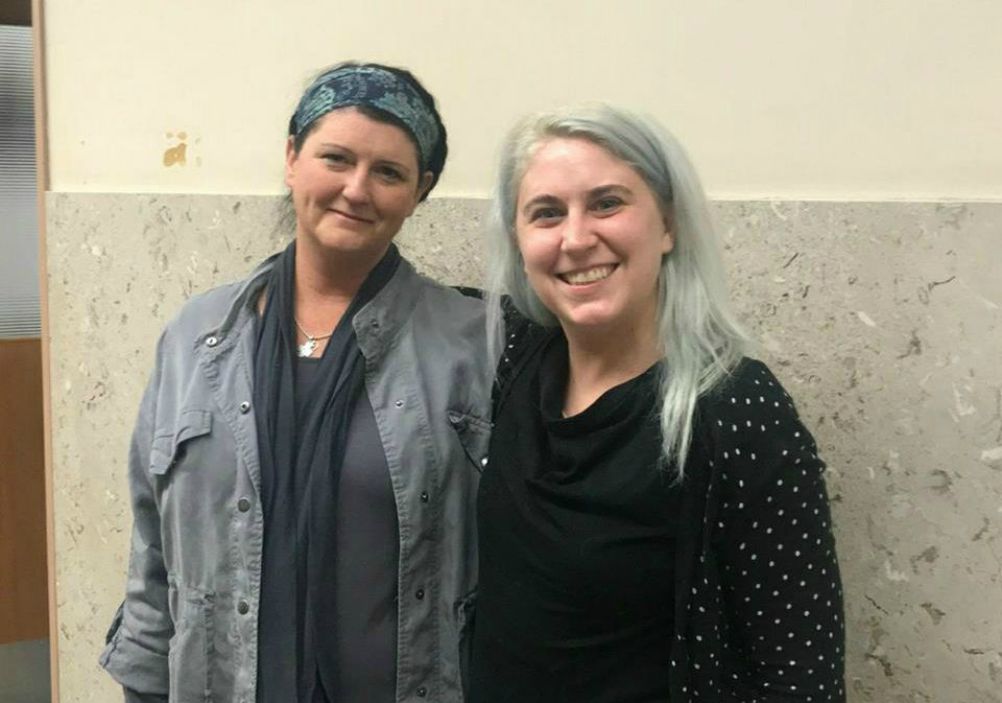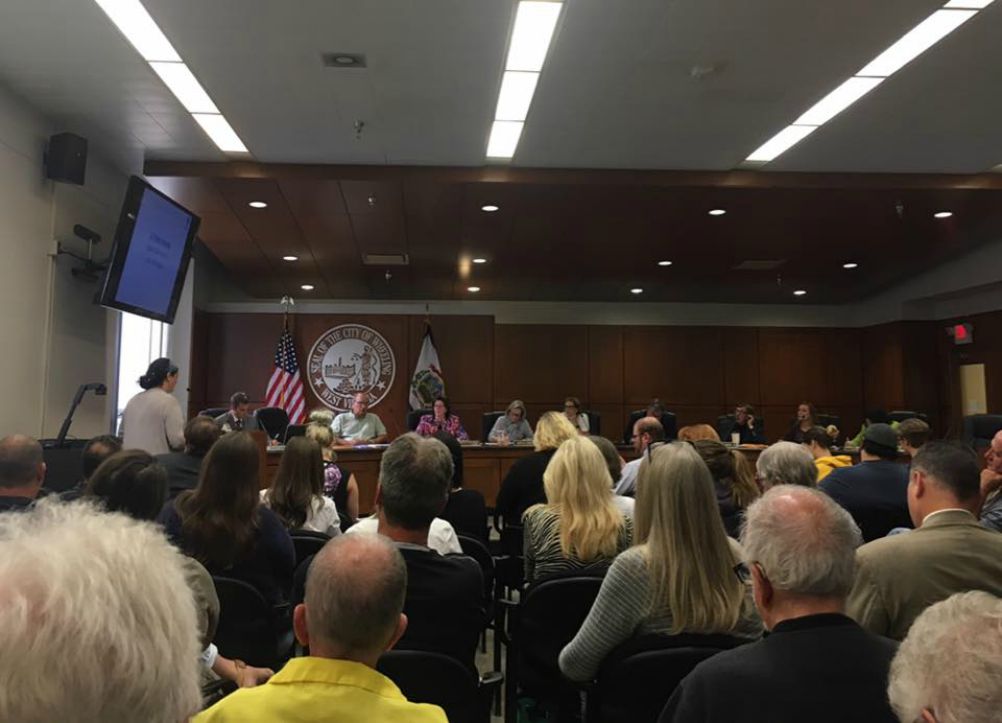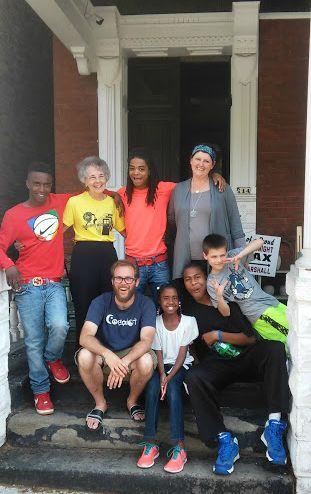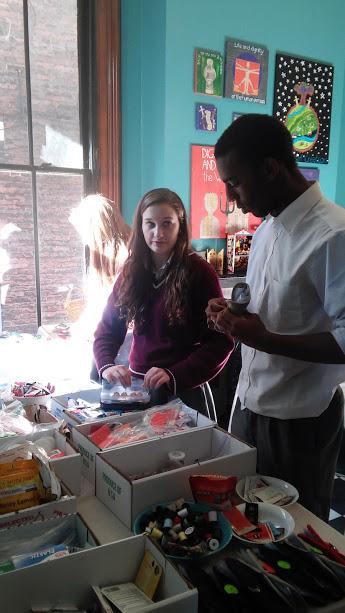
Kate Marshall, left, and Jamie Crofts legal director of the American Civil Liberties Union of West Virginia after the final Planning Commission hearing Sept. 11, 2017, that included the House of Hagar case (Courtesy of Kate Marshall)
The Gospel sometimes calls us to be out of step with the rest of society, said Catholic Worker Kate Marshall.
Faced with complaints from her neighbors that threatened her ability to operate House of Hagar Catholic Worker in Wheeling, West Virginia, Marshall took it as an affirmation that she was "on the right track" and a chance to start a conversation about tolerance and inclusion.
"We opted to go the route of bearing wrongs patiently and using it as an opportunity to really open up a conversation and a dialogue about who we are, how we live out our faith, what Catholic Workers are, and ultimately what as Christians that we're called to do in our faith, in our treatment of other people," said Marshall.
Marshall started House of Hagar in 2012, running it out of the home she shares with her children, both biological and adopted, and with other workers who join the community for a few months or years.
She offers hospitality to her neighbors in East Wheeling, who include residents of a nearby homeless shelter and people who live in tents and under bridges, by hosting a Sunday meal and fellowship, collecting and distributing donations, allowing people to use her shower and responding to other needs as they arise.
Advertisement
"I think what's at the root of all of that is people knowing that they're loved and wanted," said Marshall. "When they come to House of Hagar they know that not only are they wanted but we actually feel like they are a needed and valued part of our community and we can't be that without them."
Marshall's ability to continue this work was jeopardized in 2016 when some of her neighbors complained to the city about House of Hagar. The city Planning Commission responded by asking Marshall to apply for a permit.

Wheeling, West Virginia Planning Commission meeting Sept. 11, 2017 (Courtesy of Kate Marshall)
According to City Solicitor Rosemary Humway-Warmuth, who advised the commission, Marshall's multiple weekly ministries "took [House of Hagar] out of the realm of a single residential house." While this was permissible in her zoning district, the city's Planning Commission wanted to impose some conditions.
Marshall sought help from the American Civil Liberties Union of West Virginia (ACLU-WV). Despite believing she would have a strong freedom of religion case in federal court, she chose to cooperate with the permit process and "enter into a much more vulnerable place of conversation and dialogue to be an example of how problems can be addressed and maybe worked through outside of a judicial system."
"Going to court was not the first answer for us," Marshall added. "Actually that would have been the last answer. And even if we'd won we would still always have this feeling of loss because we were in conflict with the community or the city that we dearly love."
Marshall successfully applied for a permit, but called on the ACLU-WV for help with the permit's annual review when she learned that the city was not recommending renewal.

Precious Blood Ministry participants from Chicago, including Sr. Donna Liette, second from left in back, visited the House of Hagar Catholic Workers and neighborhood youth to talk about restorative justice. (Courtesy of Kate Marshall)
"I don't know that really under federal law Kate should be required to have a permit at all; and the city was never really able to answer the question of what they would try to stop her from doing if the permit was not granted or was rescinded," said Jaime Crofts, legal director of the ACLU-WV, who represented Marshall.
"As a Catholic Worker, Kate really truly lives out her faith, and part of her faith is opening her home for fellowship or for people to stay with her," said Crofts. "These are a part of Kate's daily life and how she lives her faith, and that's not something that the ACLU feels that a city or any government should be able to stop her from doing."
Humway-Warmuth insisted that the Planning Commission did have the right to impose some conditions on House of Hagar, such as requiring it to have ancillary parking for large events.
"[The law] protects both the neighborhood interest and the concerns of the general comprehensive plan and the land use zoning and it also protects people like Kate and persons that want to live out their faith," she said. "I don't think you wave a flag that says 'we're under religious land use and therefore we can have no restrictions.' "
However, Humway-Warmuth also said some complaints were unfounded or should be addressed by other city agencies, if necessary. After investigating the complaints, and before the Planning Commission voted on the permit, the city reversed its recommendation.

Students from Central Catholic High School help assemble Christmas gifts for the homeless at the House of Hagar. (Courtesy of Kate Marshall)
Marshall was able to disprove many of the complaints by showing the house had never been in trouble with the police or health department, and using her own security cameras to demonstrate they kept reasonable hours.
Other "evidence" against the house included a photo of a woman of color sitting on the curb by House of Hagar. "She wasn't doing anything illegal or wrong," said Marshall. "Maybe she didn’t have enough money in her pocket or she was the wrong color, to the complainer."
The city's investigation of the allegations also included two public hearings. While some of Marshall's neighbors spoke against House of Hagar, others spoke in its favor, as did members of local religious groups. On Nov. 13, 2017, the planning commission unanimously voted to let the permit stand.
Humway-Warmuth expressed satisfaction with the resolution. The decision will "hopefully make some peaceful use within that neighborhood and allow [Marshall] to carry out her mission and the neighbors to continue being comfortable within their neighborhood," she said.
Marshall was also hopeful, but said it will be necessary to address the root of the conflict: "fear of the other." She explained that House of Hagar is located in a low-income community that is becoming gentrified.
"It's a real test for Wheeling," said Marshall. "I really do feel if people go into it intentionally and being inclusive-minded there's room for all of us, but if there's a part of society that is going to be pushed out or not be included, unfortunately it usually tends to be the poor."
"A lot of those complaints, while they might have felt very real to the person stating them," were unfounded, said Marshall, "but that doesn't mean that we also can disregard the fact that there's people feeling this way. … We need to discuss prejudice. We need to discuss the criminalization of homelessness. We need to find a way to come together as common humanity."
[Maria Benevento is an NCR Bertelsen intern. Her email address is mbenevento@ncronline.org.]








